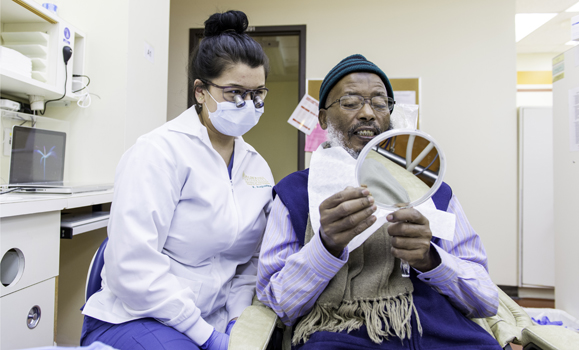A new program for Dental Hygiene students at pilipili¬˛ª≠ is helping provide them with access to more complex cases while teaching them about giving back to the community.
In 2012, Heather Doucette, assistant professor in the School of Dental Hygiene, worked with her colleagues to develop a partnership with Nova Scotia’s Immigration Settlement and Integration Services (ISIS), a community organization that provides assistance and services to the province’s new immigrants.
“I thought treating patients from ISIS would be a good learning experience for the students for developing skills, plus it would serve an underserved population,” says Prof. Doucette. “This was a great learning opportunity for the students to be exposed to patients who have a tremendous need for oral health care.”
Meeting a community need
Prof. Doucette held a screening session at ISIS office to determine if patients met the proper requirements to be treated. She remembers thinking that there wouldn’t much turnout at the initial screening.
“It was February, freezing cold and there was a bus strike,” she recalls. “I thought there was no way there would be many people showing up since they have no means of transportation. However, when I arrived there were 50 people in the waiting room all hoping to be seen. I was totally shocked!”
Most of the prospective patients were from Bhutan and Nepal and resided in Clayton Park. They had walked in -20 degree weather to the Mumford Road location for a chance to possibly be chosen to receive care. Many had been living in refugee camps for years and had never received oral health care. Prof. Doucette even saw some patients who had serious oral lesions, which can lead to oral cancer.
“No one had ever looked in their mouths, so these lesions would have gone undetected for years,” says Prof. Doucette. “If it wasn’t for the program, they may have never received treatment.”

Second-year Dental Hygiene student Krystina Augustine with patient Saeed Abdelhamid. (Chris Parent photo)
After a one-year absence, the program has resumed and is now made up of mostly Congolese patients. One such clinic happened this Monday — well timed, given that it’s currently National Dental Hygienists Week (part of Oral Health Month). The week is focused on the importance of practicing proper oral health, educating Canadians about the essential role dental hygienists play in their overall health.
Opportunities for students
There are still many barriers to work through, and the program provides a learning curve for students in more ways than one.
“It’s been difficult to communicate with the patients about their diagnosis and teaching proper brushing and flossing techniques,” says Michelle Robichaud, a second-year Dental Hygiene student. “Even simple tasks such as asking them if they are in pain or booking the next appointment have been challenging.”
Although it may be difficult to communicate, the results have been rewarding for both the patients as well as the students.
“I was treating a timid elderly lady who was a refugee patient from the Republic of Congo and she didn’t understand any English,” says Robichaud. “When the appointment was over I gave her a mirror to look at her teeth. While she was looking in the mirror she had the biggest smile and nodded her head and said thank you in her language. It was a really great feeling to know how much she appreciated her hygiene appointment.”
Prof. Doucette is pleased with the program and what it has given not only to the patients, but also to the students.
“I’m hoping this experience doesn’t just provide students with clinical skills, but instills compassion and encourages them to give back to their community by seeing a need and using their profession to fulfill it,” says Prof. Doucette. “Maybe when they go out in private practice they can devote a morning a month to treat patients that don’t have a means of accessing care.”

